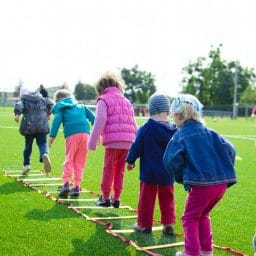A diagnosis of childhood hearing loss usually prompts a lot of questions and concerns from parents. While it’s totally normal to feel overwhelmed, rest assured that your child’s audiologist is there to support you every step of the way. To get you started, we’ve compiled an overview of information about childhood hearing loss.
Is Childhood Hearing Loss Common?

It’s unclear exactly how many children in the U.S. and around the world have hearing loss. In a 1998 study called “Prevalence of Hearing Loss Among Children 6 to 19 Years of Age,” researchers examined national population-based cross-sectional surveys, in-person interviews and audiometric testing from 6,166 children. They found that 14.9% of children had hearing loss of at least 16 decibels.
According to the World Health Organization, approximately 60% of cases of childhood hearing loss are due to preventable causes, and about 1.1 billion young people are at risk of hearing loss caused by noise exposure in recreational settings.
What Causes Childhood Hearing Loss?
Babies can be born with hearing loss, known as congenital hearing loss, or the condition can develop later in life, which is called acquired hearing loss.
Congenital Hearing Loss
Congenital hearing loss may be caused by genetic factors or non-genetic factors.
Genetic factors include:
- Autosomal recessive hearing loss. This means neither parent has hearing loss but both carry a recessive gene for hearing loss
- Autosomal dominant hearing loss. This indicates one parent who may or may not have hearing loss carries a dominant gene for hearing loss
- Genetic syndromes. These include Usher syndrome, Treacher Collins syndrome, Waardenburg syndrome, Down syndrome, Crouzon syndrome and Alport syndrome
Non-genetic factors include:
- Birth complications
- Prematurity
- Nervous system or brain disorder
- Use of ototoxic drugs by mother during pregnancy
- Infection during pregnancy
- Maternal diabetes
- Drug or alcohol abuse during pregnancy, including smoking
Acquired Hearing Loss
Some children acquire hearing loss later in life. Common causes of acquired hearing loss include:
- Perforated eardrum
- Otosclerosis
- Meniere’s disease
- Infections like meningitis, measles, mumps or whooping cough
- Ototoxic medications
- Head injury
- Exposure to excessive noise
- Untreated or frequent middle ear infections
- Secondhand smoke exposure
Address Childhood Hearing Loss Early
Hearing is an essential sense when it comes to children developing their speech and language skills. Early intervention for hearing loss is crucial; if you suspect your child has hearing loss or if their teacher at a Jefferson County school reports they’re having trouble in class, contact your doctor right away. For more information about childhood hearing loss or to schedule an appointment, call Heuser Hearing Institute today.